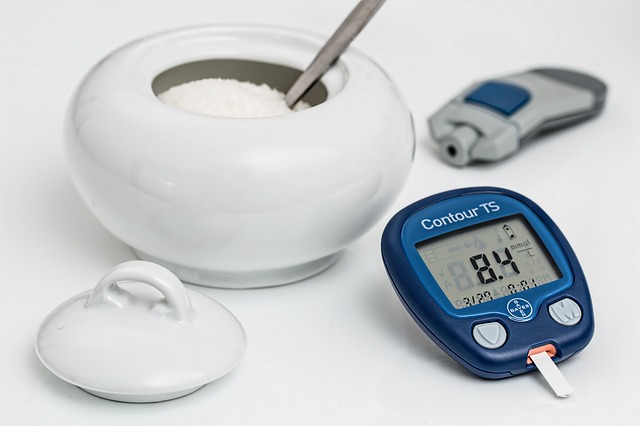Have you ever wondered what exactly is diabetes? Does it affect me or my loved ones? What’s the big deal anyways? Can’t I just ignore it and go on with my life?
For Diabetes Alert Day, we’re going to (hopefully!) convince you why it is important to know if you are at risk for developing Type 2 diabetes and, if so, how to decrease your risk and manage your blood sugar to help avoid complications from diabetes.

Let’s get down to basics with guest blogger and Sr Registered Nurse, Jeanne Evans, BA, RN, CDE.
Jeanne received her B.A. in Education from UNC-Chapel Hill and her RN from Watts School of Nursing and is a Certified Diabetes Educator. She is a member of the Research Triangle Association of Diabetic Educators and The American Association of Diabetic Educators.
What is diabetes?
Diabetes is simply an excess of sugar in the blood. The complexity comes in when the chronic excess sugar in the blood causes problems for the rest of the body. Chronically elevated blood sugar causes heart disease, loss of eyesight, kidney disease, foot numbness and tingling…just to name a few.
You have too much living to do to be burdened with poor health when there are ways to better manage your health!
You have too much living to do to be burdened with poor health! Learn ways to better manage your blood sugar and health TODAY! #diabetesalertday #saslife Share on XWhat are the risk factors for developing Type 2 diabetes?
Take the quiz and see for yourself.
If you are at risk for developing diabetes, make an appointment with your primary care provider. He or she will be happy to assess your current health status and make recommendations for next steps for a healthier you.
How do I manage my blood sugar levels?
Most of the time, excess sugar in the blood is due to too much processed food and sweetened beverage intake and/or too little daily movement/exercise.
Does that mean you have to give up all your favorite foods and exercise for hours every day? NO! It’s all about baby steps.
Nutrition
Diet plays a huge role in managing glucose levels. If you try to fuel your body with poor quality foods and drinks, it’s not going to respond well which can leave you feeling drained with less than optimal blood sugar levels.
Simple eating strategies such as anchoring and swapping out processed carbohydrates for nutrient dense carbohydrates can stabilize your blood sugar levels. As one of my patients recently learned, decreasing soda intake from 3 cans a day to 1 significantly lowered her 90-day blood sugar average. She didn’t make any other changes, just that one! She was so encouraged with her progress that she slowly made other changes to her diet and incorporated movement into her day. She feels much more energized and has drastically decreased her risk of developing complications from elevated blood sugar.
To figure out the best eating plan for your specific needs that you can both live with and actually enjoy, work with a Registered Dietitian/Nutritionist. And don’t worry, you don’t have to completely change your eating habits overnight! You’ll take things one small change at a time.
For SAS employees and covered family members in Cary, NC, take advantage of the Registered Dietitian/Nutritionists at the Health Care Center to learn more.
Not a SAS employee in Cary, NC? Find a dietitian near you!
Exercise
Do you wake up every morning jumping at the chance to run on a treadmill? Not so much?! That’s okay, me neither!
You don’t have to run 5 miles every morning at 5am to manage your blood sugars. Instead, follow an activity plan (notice I did not call it “exercise”) that you can live with and enjoy. If you don’t want to have to leave your house to exercise, find activities that you can do in the comfort and convenience of your own home.
And again, start small. (Seeing a pattern here?) Incorporate more activity into your day at a pace that works for you because every little bit of movement helps!
For SAS employees and family members in Cary, NC, take advantage of the certified personal trainers at the Recreation and Fitness Center (RFC) if you need assistance developing an appropriate activity plan
Not a SAS employee in Cary, NC? Reach out to a certified personal trainer in your area.
Blood Sugar Monitoring
Does the thought of pricking your finger 3 times a day to determine blood sugar scare you away from ever going to see a provider about diabetes? Worry no more!
A diabetes nurse educator will work with you to come up with a plan that does NOT involve 3 finger pricks a day, but does help you address elevated blood sugar and health. It will be a plan that you can live with and live better with!
The truth is VERY FEW people with Type 2 diabetes have to test their blood sugar anywhere near 3 times a day. The technology of finger pricks has come a LONG way and is much less painful than in the past. Plus, there are new continuous glucose monitors available that only require two pricks a month!
SAS Diabetes Self-Management Team
To combat the rising incidence of Type 2 diabetes, the SAS Health Care Center and Recreation and Fitness Center joined forces to offer an extensive education program for managing diabetes and pre-diabetes. The SAS Diabetes Self-Management Team is here to help you take steps to better control your blood sugar and live an enjoyable life filled with health and balance.
For SAS employees and covered family members in Cary, NC, contact any of the DSMP Team Members or call the Health Care Center for more information or to set up an appointment.
Not a SAS employee in Cary, NC? Look for similar diabetes self-management programs in your area. Many large hospital systems, health departments and community outreach centers offer such programs and classes.
Bottom Line
Diabetes care and management have come a long way and it is easier than ever to manage blood sugar and avoid complications of diabetes. Whether you are looking to prevent or manage Type 2 diabetes or want to help a loved one better manage their diabetes, start the road to better health today! Small changes make a huge difference!






1 Comment
Great read! This article really gave me a better understanding about diabetes. I'm also going to share this to my dad. He's diabetic and I know he's going to like this article. Thanks for posting and sharing!